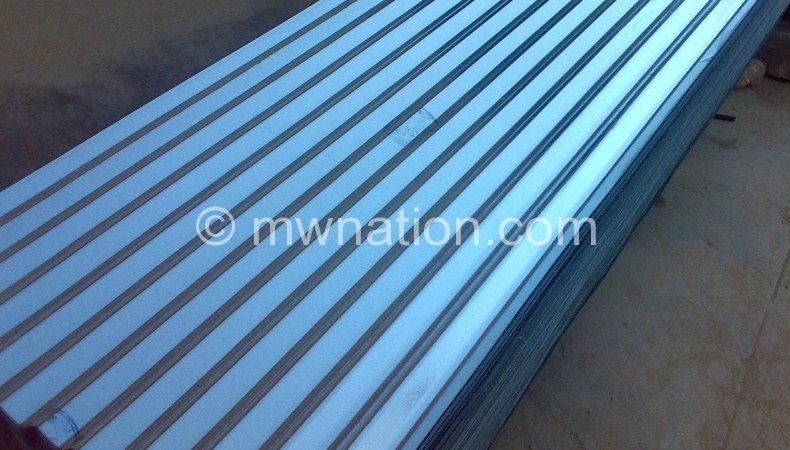Cement, iron sheets subsidy shifts focus
Government has said it will no longer directly subsidise the cost of buying cement and iron sheets under its Decent and Affordable Housing Subsidy Programme, but will instead build the house and split the cost with beneficiaries.
Instead, government will construct 80 to 100 houses for low-income households in each constituency annually for the next five years and the beneficiaries will be expected to pay back half the amount in five years, public relations officer for the Ministry of Lands, Ayam Maeresa, has confirmed.
 On an average of 90 houses per constituency, government will construct 17 370 houses annually and 86 850 over a five-year period.
On an average of 90 houses per constituency, government will construct 17 370 houses annually and 86 850 over a five-year period.
“The Decent and Affordable Housing Subsidy Programme is targeting low-income households and beneficiaries will repay half of the total cost of the materials obtained over a five-year period, which is ample time to meet their financial obligations,” said Maeresa in an email response to a query on the progress of the programme.
He further said the change in focus from subsidising the cost of materials to building the house does not entail that government moved away from the original concept.
“There is no change of focus, we are still within the scope of the concept as approved by Parliament to subsidise the cost of cement and iron sheets which are major ingredients in the construction of a decent standard house.
“This cannot just end at provision of cheaper building materials, we have to ensure that the houses are really constructed, hence Housing Development Groups (HDGs) assisted by housing development officers from the district councils will constantly monitor the process,” Maeresa said.
Maeresa further said the ministry will work with district councils to facilitate the formation and training of independent member-based HDGs within the area of each group village head which will be the vehicles through which beneficiaries will be identified and assisted.
“To benefit from the subsidy, a person must be a member of an HDG in a particular area and they will be entitled to a maximum of 30 iron sheets and 30 bags of cement of 50 kilograms each.
“Since the size of people’s houses will obviously be different, beneficiaries will be provided with materials that are in line with their various needs,” added Maeresa.
He further said the programme would be driven by HDGs while chiefs, councillors and members of Parliament will only play an oversight role.
“These groups will be responsible for identification of beneficiaries, assessment of members’ needs and ultimately provide the subsidised building materials. Chiefs, councillors and MPs won’t be part of these groups because they already belong to other equally important structures. Their role will be to provide oversight functions,” he said.
Executive director of the Malawi Economic Justice Network, Dalitso Kubalasa, who doubted the viability of the subsidy, feels the new arrangement does not address concerns people had with it.
“Much as we would all want to compel ourselves into believing that this programme will work, there still remains an uncomfortable feeling that a number of issues could go wrong,” Kubalasa said.
Kubalasa further faulted government’s investment in a political programme during a period of scarce resources and natural calamities.
“A few contentious issues still remain unresolved and unclear. The major among these are issues to do with what evidence informed this programme; above all else, the beneficiary targeting, the political risk assessment and mitigation as well as the recovery structures and mechanisms themselves.
“The issues of the cost versus returns also remain paramount, particularly when we weigh the pros and cons, cost and benefits and the opportunity cost of the K7 billion in a highly constrained year like this one with no budget support and the tragedy of the floods, among others,” Kubalasa said.
According to Maeresa, the housing subsidy programme also has a component for a grant scheme under which five houses, complete with a kitchen, bathroom and a toilet, will be constructed for free in every constituency each year for vulnerable groups such as the aged, child-headed families and those living with severe disabilities.
In May 2013, former president Joyce Banda launched Mudzi Transformational Trust with similar objectives but by November 2013, it had constructed 500 houses for K1 billion.
Maeresa was optimistic K7 billion would be sufficient to construct 80 to 100 houses per constituency and the ministry would ensure that the programme is implemented to the letter.






It is still a pipe dream. If you target low income earners chances of recovering the cost of materials from them is almost zero. Be honest give it to them or let those who can afford to buy do so, but if you want low income earners to pay you back that is almost building a pie in the sky. Even if you give them for free our country has a history of wickedness when it comes to corruption. The houses could end up in the hands of relatives who work in that particular department.